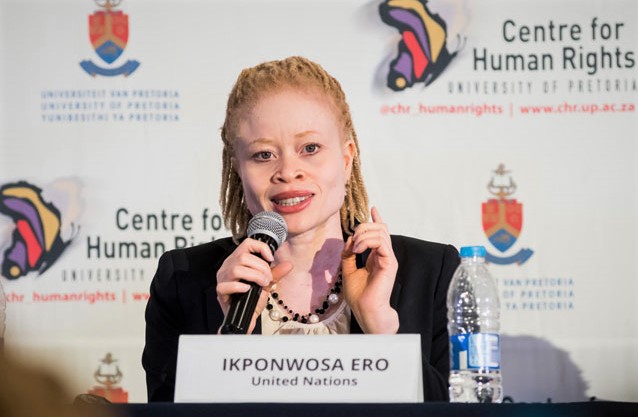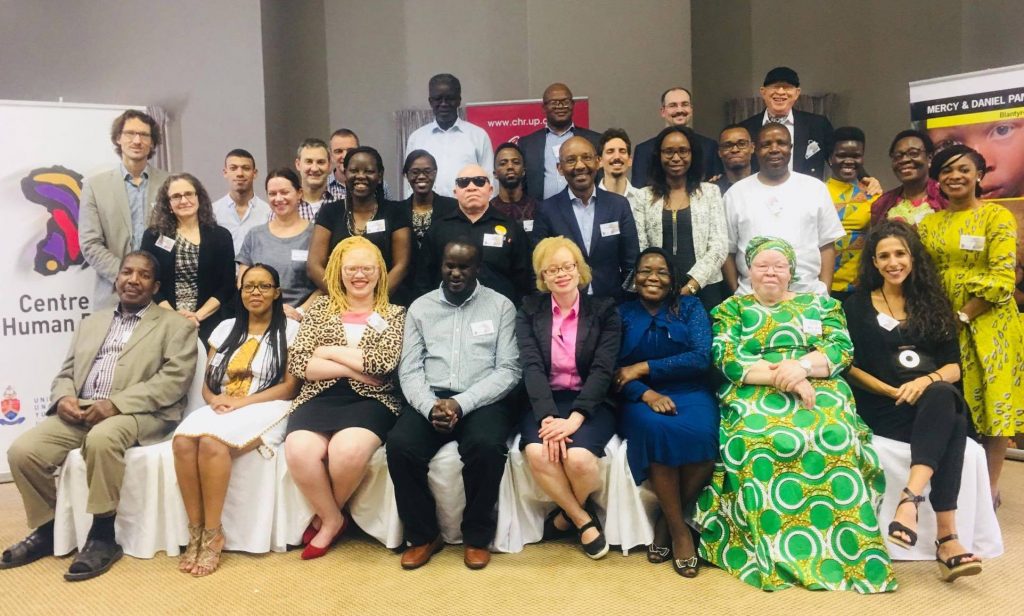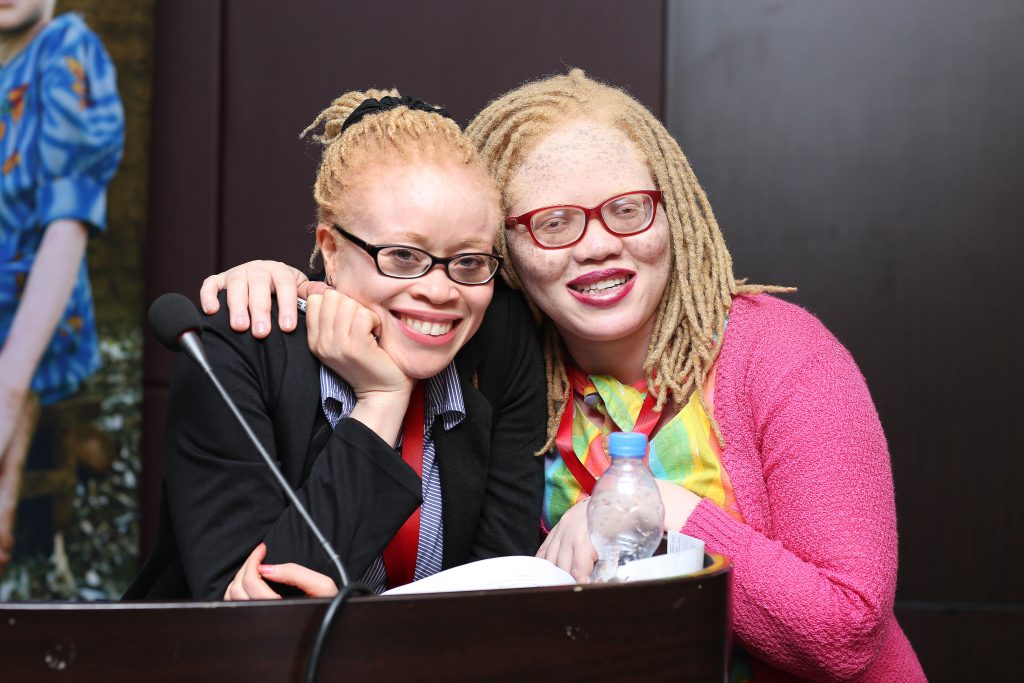“I wish that generations born from now will read about these issues as history that no longer occurs and one that ought never be repeated.”
Nigerian lawyer Ikponwosa Ero has been defending the rights of people with albinism at the United Nations (UN) as an independent expert for six years. A mandate that she defines as “a journey to climb Mount Kilimanjaro” and which has been guided by the cross-cutting principle of the Sustainable Development Goals focused on “leaving no one behind, starting with those furthest behind”, as the activist herself states.
From Beyond Suncare we chatted with her about the “most stimulating” stage of her life both professionally and personally, where she defines herself as “humbled and overwhelmed” by the kindness of all the volunteers who were key to her work and for whom she only has “good wishes”.
B.S: What do you think have been the main achievements regarding the rigths of people with albinism?
IK: There are so many achievements to be grateful for. W developed the regional action plan on albinism in Africa in collaboration with the African Union; I visited countries where albinism had hitherto received scant attention such as Brazil and Fiji; formed the global albinism alliance, forming the Africa Albinism Alliance, conducted hundreds of awareness raising events in Africa, Asia, and South America; carried out several activities to highlight the often-unspoken issue of harmful practices related to accusations of witchcraft and ritual attacks which disproportionately impacts people with albinism in parts of Africa and I joined forces with the African Union Pan African Parliament to develop guidelines on the issue. I partnered with the academic sector to promote research on albinism and human rights. This has led to a more than tenfold increase in such research leading to an exponential amount of reliable information on the right to health, education, on disability rights as it pertains to people with albinism, on women and children impacted by albinism among others.
The situation of people with albinism has been significantly mainstreamed in international human rights discourse. People with albinism and their family in many countries now have access to government support in ways that they never did. Many organizations representing persons with albinism are now receiving funding for at least a part of their operations.
Data on people with albinism has also increased in quantity and quality with more countries including an indicium for people with albinism in their censuses such as in Malawi and Kenya, and several others conducted surveys and in-depth situation analyses including Uganda, Nigeria and Namibia. I also partnered with the private sector on several public-education events including the online concert on international albinism awareness day for the year 2020 which was part of a campaign that reached over a 1 million people across several social media platforms. There are many more achievements that I am unable to list which can be read here.
Certainly, I did not accomplish these alone but through symbiotic relationships with heroic personalities and organizations working both internationally and at the grassroots.
B.S: And what challenges remain?
IK: Admittedly, myself and my collaborators could not do everything. In the future, I hope more effort and support will flow into skin cancer prevention. This is an area that has much need but response from grantors and governments are often too slow. We also need to do more awareness-raising in more countries beyond Africa. In particular, I am thinking of many parts of Asia and South America. Surely, we also need to re-strategize to bring a definite end to physical attacks that still continue against people with albinism in some parts of Africa. The impact of the COVID-19 pandemic on funding for organizations representing persons with albinism has been negative in many respects. I hope that more efforts would be made to channel more support to these groups who do a lot of noble and difficult work with little to no resources.
B.S. How would you define the situation of people with albinism in most sub-Saharan African countries?
IK: Overall, a tremendous amount of awareness has been raised on the situation of people with albinism on the African continent. There is almost no one from the continent who is not aware of the situation of people with albinism. Most people are aware of reports of attacks and discrimination against persons with albinism in several countries in the region. Most people are equally aware of the need to take action to promote and protect the human rights and dignity of people with albinism and there is a lot of goodwill from most governments. It is for this reason that the African Union extended the regional action plan for another ten years i.e. from its initial end date of 2021 to 2031.
Some governments have gone as far as declaring their own national action plans on albinism with multi-year budgets. This approach is now the gold standard on what countries in the region ought to be doing on this issue, and we hope to continue to promote it going forward. If many more countries take this approach, we will retain all the gains we have made to date and there will be such a seismic shift for the better for people with albinism and their family members across the continent within less than a generation. I am confident of this because of the enormous growth of albinism advocacy groups, led by increasingly capable people with albinism. I believe many of these are gradually and successfully engaging stakeholders to support them and they are also holding their governments accountable. While there is a long way to go on the continent, we are far better than ten years or six years ago. For more information on the progress of countries in Africa on this issue, click here.
B.S: Which countries in Sub-Saharan Africa have made the most progress with regards to the rights of people with albinism?
IK: Many countries have taken impressive strides. However, if I had to choose, I would say Kenya. Kenya has set aside a budget of roughly one million US dollars annually for their albinism policy. The policy has been in effect for over a decade now and it covers the cost of sun protection creams for people with albinism in Kenya. It also pays for some skin cancer treatment, some visual devices and pays also for awareness-raising. I also wish to commend Malawi for replicating the Kenya model and I urge other countries in the process of replicating the model to complete that process including Uganda, Kenya, South Africa, and Tanzania.
B.S: What is your wish for all the people with albinism on the African continent?
IK: I wish that people with albinism on the African continent will be increasingly treated as fellow human beings deserving of respect. That they will also be seen as people with inherent dignity, qualities and talents to offer. I hope that they will be offered support to thrive and that such support does not remain accessible only to a privileged few with the wealth or the confidence to advocate for themselves. I also hope that reports of discrimination, stigma and attacks will soon become something of the distant past. That generations born from now will read about these issues as history that no longer occurs and one that ought never be repeated.
B.S: An advice / recommendation for your successor?
IK: Always remember who you are working for.
You are working for that baby who is vulnerable to attack. You also work for that toddler who already has pre-cancerous lesions on his skin; for that mother being forced to abandon her child; and for that child that was abandoned. You are working for those that struggle against discrimination in the health and education systems and in their family and community. You are also working for those who have already died untimely deaths due to attack or discrimination – whose memory you now honour by protecting others.
This thought will carry you through all the ups and downs, which you will no doubt encounter even as you journey upwards toward the summit of success.
Ikponwosa Ero
Lawyer, United Nations Independent Expert on the enjoyment of human rights by persons with albinism




